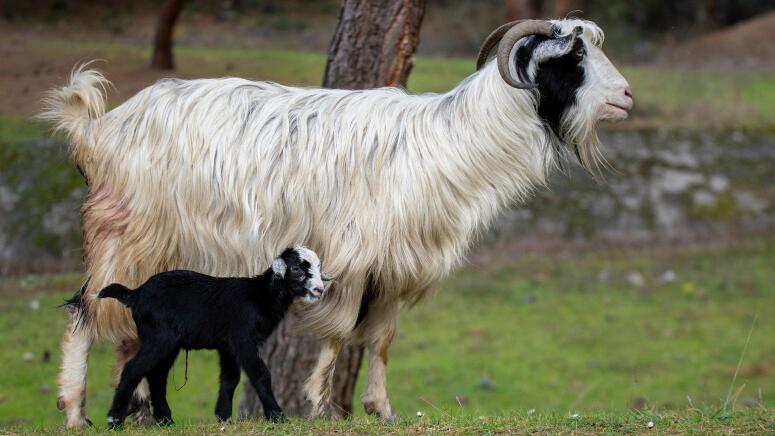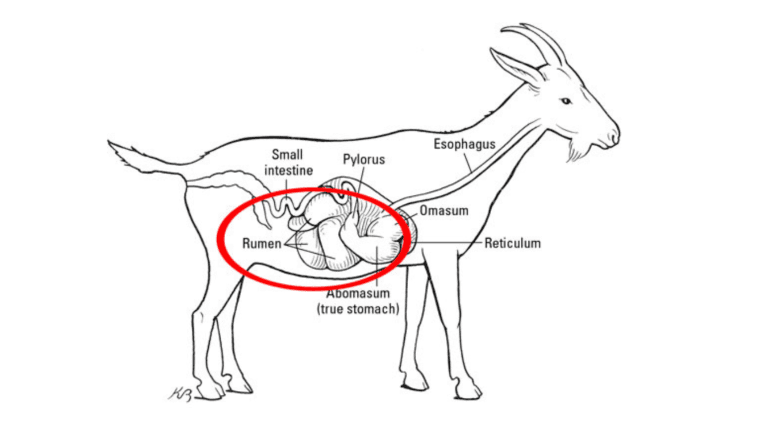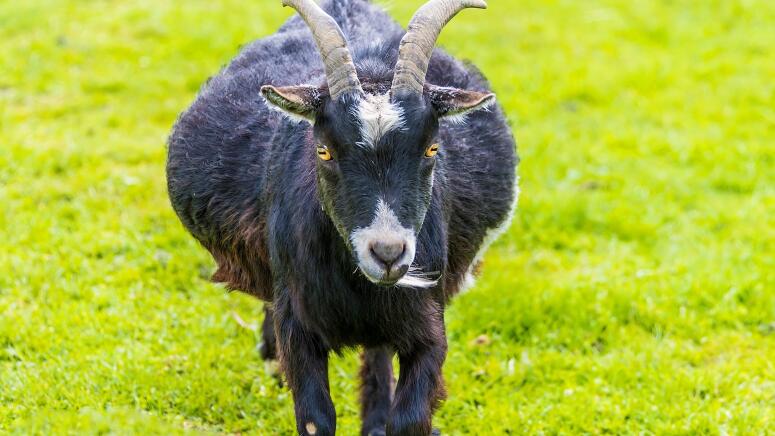Posted by Jennifer Sartell, Professional Homesteader & Blogger, Fri, May 11, 2018; updated Fri, June 23, 2023
Baking soda can be a useful addition to your goat’s diet. It can aid in digestion issues and help to prevent bloat, a sometimes deadly condition caused by overeating or eating the wrong food.

Goats are notorious escape artists and can be extremely cunning. They will commonly hop over fences or mow down barriers to gorge themselves on grain. In the spring, sometimes returning to thick, green, lush pasture can cause stomach upset.
“An ounce of prevention is worth a pound of cure.”
While I can’t find any hard scientific evidence that baking soda is beneficial to goats’ health, I can say that we’ve always offered it to our goats and we’ve never had a problem with bloat. Our livestock vet has also recommended it as a preventative.
The Domestic Goat Diet and Baking Soda
You might be asking yourself, “Why would a goat need baking soda?” I tend to question suggestions that veer away from how an animal is raised in nature. While a form of sodium bicarbonate does occur naturally in the wild, it surely isn’t available to goats in the quantity that would be offered in a domestic setting. To understand how baking soda helps, it’s good to have a refresher on the goat’s digestive system.
Goats are ruminants, which means they have a multi-chambered stomach that works like a fermentation vat. Bacteria in the stomach break down the goat’s food, making nutrients available to the animal. Acids in the true stomach chamber then digest these smaller fermented food particles so the goat can absorb nutrients.

The goat is also a grazer by nature, meaning that as the herd moves over the countryside/mountains it nibbles here and there, eating small amounts of food throughout the day. Contrary to popular belief, goats are in fact not pasture animals. They can be successfully raised on pasture, but a true goat diet consists of shrubs, leaves, weeds and brambles, not grass.
For the modern goat keeper, this bramble-type setting can be difficult to provide to a herd while still keeping your animals in fenced areas. Once a goat has cleared a pasture of its brambles, it’s difficult to add more. So, when put on pasture a goat will resort to eating grass; however, if too much is consumed at once it can overwhelm the bacteria in the rumen. Rich foods such as grain or alfalfa can have the same effect: the fermentation gases will build up, and in severe cases can cause bloat.
What is Goat Bloat?
Goats usually pass gas as they digest their food, releasing the fermentation gases. Bloat happens when the gases form in tiny bubbles and the goat is unable to pass them.

Symptoms of Bloat in Goats
- When you look at a healthy goat head-on, you should see their abdomen bowed out evenly on each side. If the left side (the rumen side) is extended (i.e., sticking out considerably farther than the right), your goat may have bloat
- When you tap the abdomen, it might feel like a tight, hollow drum
- When bloated, your goat may show signs of pain such as teeth grinding, pawing, moaning, resting their head against a fence, etc.
How Does Baking Soda Help Bloat?
Offering your goat baking soda on a daily basis can help balance the pH levels in the rumen (similar to how heartburn relief works in humans).
How Should Baking Soda be Fed?
Baking soda should be placed in its own designated food dish and offered to goats on a free-choice basis. Goats are clever in that they will consume it when they need it and leave it be if they don’t Do not mix baking soda into their feed or minerals. Also be sure to replace it if it gets soiled.
Be sure to always offer fresh clean water whenever you are giving salts, minerals or baking soda to goats Baking soda is an easy, inexpensive way to ensure that your goats are healthy and happy.
Author Profile: Jennifer Sartell
Jennifer Sartell is the primary caretaker of all animals on her and her husband’s farm in Fenton, MI. With a passion for living a simple life, Jennifer enjoys creating art, taking in nature, raising animals and has developed a deep appreciation for homesteading. Jennifer and her husband, Zach, currently raise goats and poultry.
Her vast amount of experience on the farm includes, but is not limited to: milking, shearing, hoof trimming, vaccine administration, assisting in animal births, dehorning, egg collecting, chick and turkey hatching, feeding, watering, etc. She can also cook a mean farm-to-table meal and when the day is done has documented and photographed their day on the farm.
More Blogs by Jennifer Sartell
- https://www.mannapro.com/homestead/caring-for-pregnant-does-part-2
- https://www.mannapro.com/homestead/caring-for-pregnant-does-part-1
- https://www.mannapro.com/homestead/preparing-caring-for-goats-in-winter
- https://www.mannapro.com/homestead/dairygoatbreeds
- https://www.mannapro.com/homestead/preparing-the-kidding-stall-part-2
- https://www.mannapro.com/homestead/a-guide-to-buying-a-new-goat
- https://www.mannapro.com/homestead/raising-kids-dehorning-wethering
- https://www.mannapro.com/homestead/milking-a-goat
- https://www.mannapro.com/homestead/raising-fiber-goats-101
- https://www.mannapro.com/homestead/hoof-care-for-goats
- https://www.mannapro.com/homestead/putting-together-a-goat-birthing-kit
- https://www.mannapro.com/homestead/preparing-the-kidding-stall-part-1
- https://www.mannapro.com/homestead/breaking-down-the-goat-diet
- https://www.mannapro.com/homestead/birthing-goat-kids
- https://www.mannapro.com/homestead/dealing-with-goat-scours
- https://www.mannapro.com/homestead/feeding-baking-soda-to-your-goats
- https://www.mannapro.com/homestead/pros-cons-and-facts-about-raising-turkeys
- https://www.mannapro.com/homestead/best-breeds-for-raising-chickens-with-children
- https://www.mannapro.com/homestead/a-guide-to-small-goat-breeds
Feature Products

